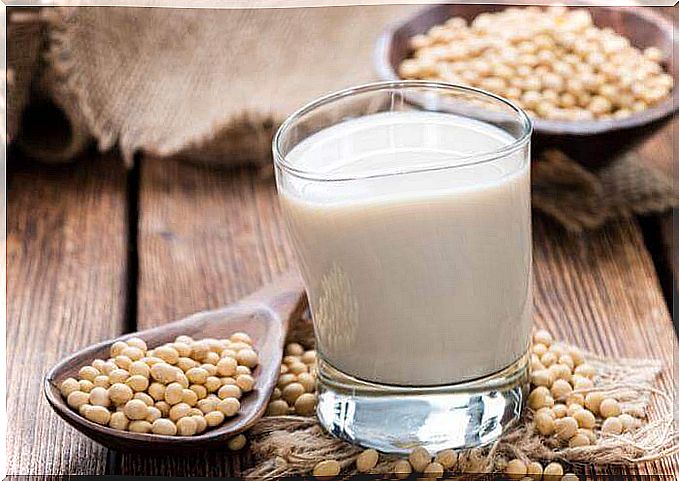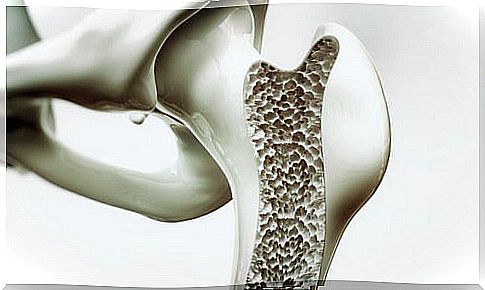Soy Milk And Its Benefits For The Body
Soy milk is a plant-based drink that is made by soaking, grinding, and filtering soybeans. Although it is not properly a milk, in popular language it has been given this label, mainly because its appearance resembles said food.
It is also one of the options to replace cow’s milk both in vegan and vegetarian recipes and in the diet of those who suffer from lactose intolerance. What are its benefits? How true is it that it has detrimental effects? Coming up next, we tell you.
Nutritional content of soy milk
Soy is a legume from the Asian continent. Its scientific name is Glycine max and it has been valued since ancient times for its interesting nutritional value. Although it has several derivative products, soy milk is one of the most common, not only for its versatility when preparing dishes, but also for its properties. Let’s see its nutritional content below:
Vitamins and minerals
Among the benefits of soy milk, we find that it provides vitamins of group B, vitamin D, vitamin K and vitamin C. In addition, it contains calcium, iron, magnesium, phosphorus, manganese and zinc.
Fats
A glass of soy milk contains 4 grams of fat, of which a small amount, 0.5 grams, is saturated fat. It does not contain trans fat or cholesterol, making it a good option for a healthy diet.
Macronutrients
A 250 ml glass of soy milk provides approximately 100 calories, 8 grams of carbohydrates and 7 grams of protein . It also contains necessary amino acids that are not produced by the body.

Benefits of soy milk
Thanks to its interesting contribution of essential nutrients, the consumption of soy milk, included as part of a healthy and balanced diet, provides important health benefits. We detail them below:
Supports cholesterol reduction
Soy is a cholesterol-free food and has nutrients that could be beneficial in improving the lipid profile. In fact, as a publication in the British Journal of Nutrition highlights , the consumption of soy could favor the control of bad cholesterol (LDL) and total cholesterol, while favoring the increase of good cholesterol.
However, it should be clarified that the researchers did not find the same lowering effect in soy supplements. Despite this, research published in Lipids in Health and Disease suggests that phytosterols and inulin in fortified soy milk have a beneficial effect in controlling bad cholesterol.
Helps reduce symptoms of menopause
The isoflavones in soy are a type of phytoestrogen that seems to have a beneficial effect on reducing some symptoms of menopause. Specifically, as supported by a study published in the journal Menopause by researchers from the National Institute of Health and Nutrition , it helps in reducing hot flashes.
Contributes to caring for bone health
Due to its content of isoflavones, calcium and magnesium, this food has a protective effect on bone health. In fact, as supported by a study published in the Journal of Medicinal Food , its consumption could favor the maintenance of bone density, reducing the risk of osteoporosis and fractures in adult women.

Other benefits of soy
As compiled by research published in the scientific journal Nutrients, soy and its derivatives have other health benefits. These, for the most part, are attributed to its content of protein, isoflavones and vitamins and minerals. We summarize them below:
- Helps moderate reduction of high blood pressure.
- It is a low calorie source of protein.
- It favors the control of high blood sugar levels.
- Supports the treatment of overweight and obesity.
- It is an option for people with lactose intolerance.
Does soy have harmful effects?
The possible side effects of soy consumption have generated quite a bit of controversy. In fact, they have been the focus of various scientific investigations. They have been able to break some myths that grew strongly in the population about the intake of this food. Let’s review it in detail:
- Some types of cancers need estrogen to grow. For this reason, it was long thought that soy, by containing phytoestrogens, could increase risk. However, data published in the medical journal Complementary Medicine Research suggest that this food has no incidence on this disease and, on the contrary, could produce a slight reduction in risk.
- Soy contains goitrogens that can negatively affect thyroid health by blocking iodine absorption. In fact, test-tube and animal studies suggest that soy isoflavones affect thyroid hormone production. Despite this, research in humans revealed that they do not cause a significant impact.
- As revealed by the journal Fertility and Sterility, clinical studies have not shown an alteration of the activity of reproductive hormones in men due to the consumption of soy
In conclusion…
Soy milk is one of the vegetable alternatives for those who have dairy intolerance or for those who have stopped consuming animal products. Its intake can help prevent various health problems, as long as it is supported with healthy eating habits. In any case, before consuming it on a regular basis, it is advisable to consult a nutritionist. Keep that in mind!









